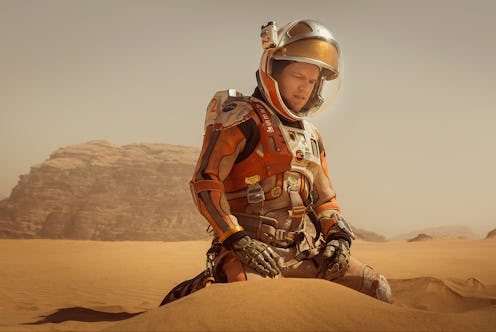Entertainment
'The Martian' Has A Different Ending From The Book

Ridley Scott's The Martian is easily one of the most anticipated movies of the year — and why wouldn't it be? For some odd reason, moviegoers have a thing for seeing people stranded on a deserted island, trapped in room, or in this case, left behind on an entire planet. Otherwise, Lost wouldn't have been so successful and movies like Panic Room wouldn't exist. People have described The Martian, a big screen adaptation of Andy Weir's best-selling novel, as a cross between Apollo 13 and Cast Away because, in short, that's exactly what it is. If you add in the 3-D element, you can also add a dash of Gravity into the comparisons. Even so, the movie stands on its own when it comes to telling Mark Watney's (Matt Damon) harrowing tale of surviving on Mars after being left behind by his crew, who thought he was dead. But like every book-to-movie adaptation, there will be some changes that diehard fans of the book may notice. For one, The Martian ending is different than the book.
Before you bring out your pitchforks and torches to go after Scott and screenwriter Drew Goddard for making changes to the original story, they didn't really make "changes," per se. They added to it. (Spoilers ahead.)
It's not that big of a surprise that Watney manages to get rescued at the movie's end. Nearly all films about people who are stranded have happy endings. Yet in Weir's book, the crew bands together and goes back to save Watney; they rescue him and that's pretty much the end of the story. Yet in the movie? An entire epilogue is added in, in the form of a nicely packaged musical montage. To satisfy curious viewers wondering what happens to Watney after his rescue, the movie adds in a "where are they now?" segment featuring Watney and his fellow crew members in their new, Earth-bound lives.
In this epilogue, Watney is seen looking healthy and back to a normal weight (spending too much time on a deserted planet and living off of potatoes isn't exactly a diet I would recommend). Even better, he is teaching some aspiring astronauts and sharing his experiences on Mars. As for his fellow crew members, we see that they have gone back to their normal lives after being in space for an elongated period of time. The disco-loving Melissa (Jessica Chastain) is back enjoying her time with her husband, while Alex (Aksel Hennie) is spending some quality time with his family. Beth (Kate Mara) and Chris (Sebastian Stan) have welcomed a brand new baby into their lives while watching Rick's (Michael Pena) space shuttle launch into space for another mission.
The NASA bigwig, Teddy (Jeff Daniels) and the rest of the ground team, Vincent (Chiwetel Ejiofor), Annie (Kristen Wiig), Mindy (Mackenzie Davis), and Rich (Donald Glover) go about their space careers knowing that they have helped bring Mark Watney back to Earth. It's a very Hollywood happy ending to a sci-fi movie — something we don't see too often.
Still, it is different than the book's conclusion. The Martian is far from the only movie that altered the ending of its source material, though. Check out some of these movie adaptations that changed the ending of their literary inspirations (some for the worse, some for the better). Again, spoilers!
Jurassic Park (1993)
In the end of the movie, the main characters escape from the island unharmed. In Michael Crichton's book, things don't end so happy. John Hammond (Richard Attenborough) dies and it seems as though Ian Malcolm (Jeff Goldblum) has perished as well.
Blade Runner (1982)
Also directed by Ridley Scott, the movie was based on Philip K. Dick's novel Do Androids Dream of Electric Sheep? The end of the book has Rick Deckard (Harrison Ford) being exposed to radiation, leading us to believe he will become mentally disabled. The movie, on the other hand, ends with the question, "Is Deckard a replicant?"
My Sister's Keeper (2009)
People weren't too happy when the movie based on the Jodi Picoult novel switched the fate of the sisters.
Watchmen (2009)
People were polarized by Zack Snyder's movie adaptation of Alan Moore's celebrated graphic novel. Perhaps it was the ending. Instead of having a giant squid destroy New York City, Ozymandias (Matthew Goode) tricks Dr. Manhattan (Billy Crudup) into changing into a nuclear bomb to annihilate the city. I would have preferred the squid.
A Clockwork Orange (1971
Author Anthony Burgess wasn't a huge fan of Stanley Kubrick's adaptation of his movie. At the end of the book, Burgess basically cured the main character, Alex ( Malcolm McDowell), from his deviant behavior, while Kubrick decided to keep him psychotic.
This just goes to show you that the book will never be exactly the same as the movie and vice versa.
Images: Aidan Monaghan/Twentieth Century Fox (2)
FYI, Bustle may receive a portion of sales from products purchased from this article.